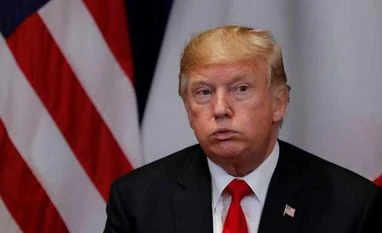US President Donald Trump may just escape having to grapple with a recession before the U.S. Presidential elections in 2020, with investors saying it is unlikely one will occur before then.
Trump has praised the U.S. economy, which grew at 3.5 percent in the third quarter, following a tax-cut-fuelled 4.2 percent gain in the second quarter. And even though economists see increased risks for a recession as the Federal Reserve raises interest rates and a trade war with China threatens the economy, such a scenario is still a few years off.
"We don't expect another recession until 2021, at the earliest," Byron Wien, vice chairman of Blackstone Group's Private Wealth Solutions Group told the Reuters Global Investment 2019 Outlook Summit in New York on Tuesday.
Richard Bernstein, Chief Executive of Richard Bernstein Advisors LLC and former Merrill Lynch & Co chief investment strategist, said he did not expect a recession or bear market before the election. "I really don't think there is a bear market on the horizon. I don't see anything that changes that."
However, some investors were less sanguine, saying a recession could still occur in 2020 but that would likely be the earliest.
"It isn't inevitable we will get it in 2020, and if we see it in 2020 it will probably be made in (Washington) DC," said Joachim Fels, a managing director and global economic advisor at Pacific Investment Management Co.
Penny Foley, portfolio manager, TCW Group Inc, thinks a recession could occur in either 2020 or 2021 because the United States is nearing the end of the credit cycle, U.S. growth has peaked and stimulus is rolling off.
More From This Section
"Our U.S. guys would feel that it's probably a 2020 type event," Foley said.
SLOWING GROWTH
Both Wien and Fels pointed to potential risks at a time the economic expansion, now nine years old, is likely to slow, while corporate earnings are also expected to taper.
One stumbling block may occur if the Federal Reserve, led by Chair Jerome Powell, raises interest rates too quickly or aggressively as inflation and employment have both been normalizing. Both Fels and Wien said the Fed will almost certainly announce another rate increase in December and at least two more in 2019.
"The Fed is doing the right thing," Wien said, adding that President Donald Trump should be boasting about how well the economy is doing instead of criticizing his top central banker for taking care to prevent an overheating by pushing rates up.
Wien and Fels agreed that the Fed's job will be challenging in preventing an overheating after Trump's tax cuts helped stimulate the economy while at the same time not tightening too much to choke off growth when the expansion really begins slowing in two to three years.
Meanwhile, trade wars are seen as a danger, both men said, noting that tariffs, including a fresh round on Chinese goods, are bound to hurt U.S. consumers. "At the end of the day the president wants a deal with China. This is what he is all about, making deals," PIMCO's Fels said.
SAUCER OR WOK?
If there is a recession on the horizon, both Fels and Wien said it would likely be shallower than the great recession in 2008, in part because excesses have not built up the way they did a decade ago when the housing market overheated.
"The next recession will be not very deep because I don't see the big imbalances in the real economy that we had in past recessions, but it could be extended because we have less tools to fight it," Fels said, adding "The last (recession) was V shaped. This one could be more saucer or wok-shaped."
)